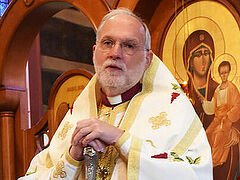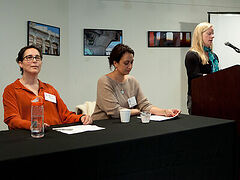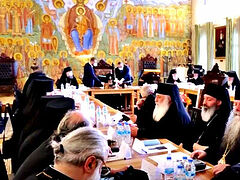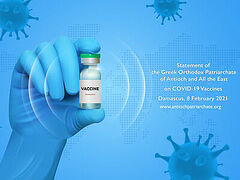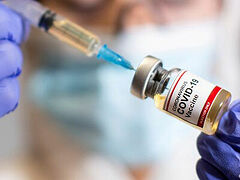U.S.A., April 16, 2021
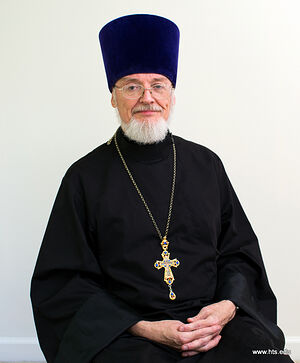 Last month, OrthoChristian reported on a recent statement from the Orthodox Theological Society in America (OTSA) concerning the various COVID vaccines. The Society argues that while it is true that the Modern and Pfizer vaccines were tested against fetal cells, they “present the best ethical option to promote health and life, despite their connection with the use of aborted fetal cells.”
Last month, OrthoChristian reported on a recent statement from the Orthodox Theological Society in America (OTSA) concerning the various COVID vaccines. The Society argues that while it is true that the Modern and Pfizer vaccines were tested against fetal cells, they “present the best ethical option to promote health and life, despite their connection with the use of aborted fetal cells.”
Opinions vary greatly even amongst Orthodox hierarchs and clergy concerning the ethics of COVID vaccines, and in a new essay, “The Moral Peril of Taking Most COVID-19 Vaccines,” Archpriest Alexander Webster, PhD, critically analyzes the OTSA’s statement.
Fr. Alexander has been a priest for 39 years, and recently served as dean and professor of Moral Theology at Holy Trinity Seminary (Russian Orthodox Church Outside of Russia) in Jordanville, New York.
He begins by emphasizing that with its statement, the OTSA “offers a seeming patina of legitimacy to an ethical argument that is abhorrent to any informed, devout Orthodox Christian.” His own purpose is to “retrieve that gauntlet and offer what I hope is a compelling counterargument.”
Fr. Alexander notes that while the OTSA claims widespread agreement among Church leadership in favor of vaccination, the OTSA, in fact, points only to two Roman Catholic sources and a Zoom conference hosted by the Patriarchate of Constantinople, in which Metropolitan Nathanael of the Greek Orthodox Archdiocese only timidly addressed the issue at hand.
On the other hand, Fr. Alexander points to four documents from Orthodox hierarchs around the globe:
-
Bases of the Social Concept of the Russian Orthodox Church (12.7): In 2000, the Bishops’ Council of the Russian Church declared the use of fetal cells to treat various diseases to be “definitely inadmissible.”
-
Greek Orthodox press release on “The Cloning of Embryonic Cells”: In 2000, the Greek Holy Synod declared that “Our Church expresses her explicit opposition to conducting experiments on human embryonic cells.”
-
Romanian Orthodox statement on “The Transplant of Organs”: The Romanian Patriarchate lists mandatory principles for the moral use of human organs and tissues, and states: “Because the extraction of organs implies the consent of the donor, extraction of tissues from an embryo is inconceivable given the fact that although alive, this one cannot give its consent.”
-
Australian Inter-Church statement: In August 2020, a number of Christian leaders in Australia, including Archbishop Makarios of the Greek Orthodox Archdiocese, wrote that while the cells currently in use are far removed from the initial abortion in the 1970s, the vaccines are still morally objectionable to many of their people, and they will suffer various disadvantages if they conscientiously object.
The OTSA’s statement is “in stark contrast to all the above,” Fr. Alexander writes. He then offers his critical remarks on several points in the Society’s publication.
While the OTSA writes that, “The vaccines were tested in culture against fetal cells to help ensure that they would not harm a fetus,” Fr. Alexander argues that this is a “disingenuous claim at best,” as the children who were aborted have already been harmed.
The OTSA says the fetal cells came from “so-called therapeutic abortions.” Fr. Alexander responds: “A weasel use of ‘therapeutic,’ which presumes some kind of medical situation: the specific abortions were planned and elective and the aborted preborn children were old enough in the womb to enable “harvesting” of organs such as their liver or eyes.
The OTSA statement distinguishes between vaccines tested on fetal cells and those grown in fetal cells. Fr. Alexander counters that, “Whether a vaccine was grown in, derived from, or tested with a fetal kidney or retinal cell is a distinction without a moral difference: the process is still ultimately connected to a heinous act of abortion.”
While the OTSA argues that the original abortions were not carried out for the sake of developing vaccines, Fr. Alexander clarifies that, “There is no evidence of the precise circumstances of the original abortions except that they were not natural miscarriages.”
The OTSA writes that, “The vaccines in no way legitimize or promote abortion,” while Fr. Alexander characterizes this as, “A disingenuous claim at best: exploiting the consequences of an abortion, particularly cells extracted from the preborn baby, entails a sharing of the guilt for the original abomination and provides tacit approval for similar exploitations in the present.”
While vaccines have been developed from these fetal cells to promote health, this “argument fails to address the crucial moral question of profiting from the original abortions,” Fr. Alexander writes.
In the next section of his essay, Fr. Alexander presents a similar statement from the late Tristam H. Engelhardt that he finds shocking in its “surprisingly sanguine, even cavalier attitude towards ‘fetuses who have been aborted.’” The whole argument is a “strictly secular, un-Orthodox consequentialist argument” that completely disregards “the intrinsically evil intent that led to the willful abortions in the first place,” Fr. Alexander writes.
“Facile ‘condemnation’ of the original evil act does not absolve anyone from benefiting from that act,” Fr. Alexander argues.
Fr. Alexander opens the next session of his essay with a note of thanks:
Thanks to the providence of God the Holy Trinity, conscientious Orthodox Christians do not confront a zero-sum decision between any or all COVID-19 vaccines, on the one hand, and, on the other hand, no COVID-19 vaccines. Several vaccines currently in development have no connections to aborted babies.
He points to a widely-circulated chart of which vaccines do and do not utilize such fetal cell lines and to what extent.
In conclusion, Fr. Alexander sums up his argument:
We must reject, on moral grounds, all COVID-19 vaccines that have any connection to aborted preborn baby cells… Time and distance are irrelevant to profiteering from such abominations for any reason, even life-saving in the present or future. According to traditional Orthodox moral theology (as opposed to revisionist variations so common today), certain actions (“means” to “ends”) are objectively, intrinsically evil under any “circumstances”—most notably, abortion, rape, incest, child abuse, physical torture, and deliberate targeting of non-combatants in war…
The New Testament, the consensus patrum, and our own Orthodox-informed consciences all testify to the uncontestable moral maxim that we may not do evil to achieve good… A “lesser evil” decision process cloaked in “greater good” language is sophistry, prelest, and sheer moral evil.
Is our own bodily health … worth compromising an informed moral conscience by benefiting in any way from the abomination of abortions?
Ultimately, our unbroken faith and hope in God the Holy Trinity and in the life in the world to come will sustain us in this present biological trial. It will take that—as well as courage—to eschew tempting but immoral medical solutions to the COVID-19 virus while waiting for a truly moral alternative.
***
Fr. Alexander has been a priest since 1982. He holds a PhD from the University of Pittsburgh and has served in various professorial roles in various universities. Most notably, he served as dean and professor of Moral Theology at Holy Trinity Seminary in Jordanville, New York, for several years. He also served as an army chaplain for 24 years.
Follow us on Facebook, Twitter, Vkontakte, Telegram, WhatsApp, Parler, MeWe, and Gab!

